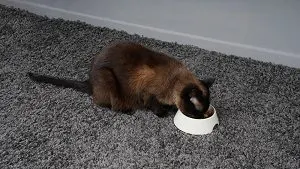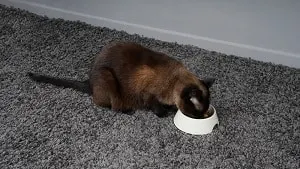 Recently you’ve noticed that your Siamese is always on the prowl for food. Usually talkative anyway, these days Meezer is meowing more than ever. You’re worried about giving in because you don’t want him to get too heavy. So, what should you do?
Recently you’ve noticed that your Siamese is always on the prowl for food. Usually talkative anyway, these days Meezer is meowing more than ever. You’re worried about giving in because you don’t want him to get too heavy. So, what should you do?
Why is your Siamese cat always hungry? There are several reasons a Siamese can be eating more. He or she could be suffering from several severe ailments that require you take him to the vet. Or your cat could be using food to relieve stress or as a substitute for an emotional need.
As you have no doubt discovered, your Siamese has bonded with you. Even though he “talks” constantly, but you don’t understand what he or she is saying. So he tries to communicate with food. Unfortunately, his message is getting garbled. Let’s see if we can figure out what he is actually saying.
The leading causes of overeating in your Siamese can be due to either a medical or an emotional condition. You will learn about each of them and what you should do to help your cat recover.
| Medical Conditions | Emotional Conditions |
|---|---|
| Hyperthyroidism or diabetes | Bored or Lonely |
| Worms | Depressed |
| Diet not providing nutritional needs |
How Much Should Feed Your Siamese
To answer that question, we need a lesson in biology. A cat has a tiny stomach—about the size of a ping-pong ball. You could perhaps fit the edible portions of two small mice in something that size. You can’t put half a cup of anything into a ping-pong ball, which is one reason you want to limit portion size.
I recently read the label of a bag of cat food. The recommendations were
- 1/4 to 1/3 cup for a 5-pound cat
- 3/8 to 1/2 cup for a 10-pound cat
- 1/2 to 3/4 cup for a 15-pound cat
Those recommendations were per day, not per portion.
You may be feeding your cat too much. I recommend that you pre-measure some portions into plastic bags. This way, you can get a better idea of how much food you have been feeding your cat.
You can check your Siamese to see if she is becoming overweight
- Run your hands around her sides and stomach. If you can feel the ribs easily, your cat has a healthy weight. If you can see his bones, he is thin.
- Look at your Siamese from above. You should be able to see his waistline behind the ribs. Folds at the sides are a sign that your cat is putting on some weight.
Medical Conditions That Cause Concern
Your cat’s persistent hunger could be caused by one of several medical conditions. All of them require visiting your veterinarian.
Hyperthyroidism
Cats with either one of these conditions have significantly increased appetites. In hyperthyroidism, your cat is burning too many calories because of her thyroid glands aren’t correctly controlling the speed with which your Siamese is consuming energy.
Instead, your cat’s thyroid glands are producing too much of the thyroid hormone. The glands are producing this extra hormone because of a tumor growing on them. The additional hormone causes your cat to burn energy too fast. A cat with hyperthyroidism will usually
- Eat regularly but still lose weight
- Drinking and urinating too much
- Possibly changes in behavior such as restlessness, increased activity, or aggressiveness
- Fur that will start to look greasy and unkempt
Diagnosis and Treatment
A blood test will determine if the levels of the thyroid hormones are too high. Afterward, your vet will consult you regarding different treatment options. There are three main ones.
| Treatment | Description | Benefits and Risks |
|---|---|---|
| Medication | Vets typically prescribe Methimazole, which reduces the amount of the thyroid hormone in the cat’s blood. Comes in pill form or as a gel that gets applied to a cat’s skin | •Cats typically tolerate it well •Over time the treatment can become expensive |
| Radioactive Iodine | Considered the best treatment choice. Consists of an injection under the skin, followed by a 3-5 day stay in the treatment center to make sure radiation levels are at an acceptable level | •Expensive •May have difficulty finding a clinic that offers the treatment within a reasonable distance •Once the treatment is finished, the hyperthyroidism will be cured |
| Surgery | The vet will surgically remove the thyroid gland. | •Cancer cells that will overproduce thyroid could be present in the body •Removal of the gland could result in your Siamese to take medicine because the body will not produce enough of the hormone |
Diabetes
In diabetes, a cat is unable to convert the sugar in food into energy. This means that the nutrition in your Siamese food isn’t getting into the cat’s body, so he feels the need to eat to get the necessary nutrients. The symptoms for diabetes are mostly the same as for hyperthyroidism. Treatment options include two: insulin injections and changing your cat’s diet.
According to the Cornell Feline Health Center, about 50 to75 percent of cats with diabetes need to receive insulin injections.
Source: animalplanet.com
Insulin therapy typically requires a visit to your veterinarian every three to four months to check insulin levels. Unfortunately, if your Siamese needs insulin, you will have to give daily shots. Don’t worry–your vet will teach you how to do it.
You will also have to change your cat’s diet. Your vet will most likely ask you to limit your cat’s carbohydrate intake to no more than 10 percent. Typically, this will mean switching from dry food to canned because almost all dried foods have carbohydrate levels that are too high.
Because cat food is labeled by weight, it can be challenging to calculate carbohydrate levels. Dr. Jennifer Coates shows you how to in this post. If you love math, you might want to go through her steps. Me, I just follow the recommendation of most vets–stick with canned food.
If you have taken your cat to the vet, and it doesn’t have diabetes or hyperthyroidism, then it could be worms.
Your Siamese Might Have Worms
If your cat is overeating, it could be that it has become infected with a parasite such as roundworms or hookworms. These parasites can increase a cat’s appetite because they are getting nutrition from your cat’s food. They can also cause swelling of your cat’s stomach. Additional symptoms might include the following
- Lethargy
- Vomiting
- Abnormal feces
- Coughing
- Anorexia
If you’d like to read more about worms in cats, Cornell University of Veterinary Medicine has a helpful guide. If you have a weak stomach, I would suggest you skip it.
If you suspect your Siamese might be infected, take him to a vet (with a fecal sample).
Nutritional Needs Must Be Met
One last cause of continuous hunger is food that is not meeting the dietary needs of your cat. A cat needs a diet high in animal protein and low in carbohydrates. If your cat is not getting those nutrients, or essential amino acids, vitamins, and minerals, it may eat too much. Make sure that your Siamese is receiving a healthy diet that provides the nutrients it needs.
Emotional Eating
Researchers have started studying how cat’s emotions are related to eating behaviors, or what they call “psychogenic abnormal feeding behavior.” Just like people sometimes use food to self-medicate, cats can do the same.
Your Siamese Could Be Bored
Siamese cats are energetic, intelligent cats who need a lot of stimulation. If those needs aren’t being met, your kitty may resort to eating, especially if you leave food out all day so your cat can eat freely whenever he wants (free feeding). As Doctor Tracey Jensen writes
“Cats aren’t grazers; they’re hunters.”
Source: Catster.com
A bored cat that has access to food all day is a recipe for over-eating. Your Siamese needs stimulation. Scratch posts, cat trees, and cat shelves provide her opportunities to explore and exercise. Cat toys, from the homemade to the ones available in stores and on-line, can keep her entertained. Siamese, because of their intelligence, benefit from puzzle toys.
Your Cat Is Lonely
Siamese cats are incredibly social cats who need lots of interaction with people and other animals. If your cat is lonely, he can turn to food as a way to mask his loneliness. Other signs to look for include
- Being destructive
- Aggressive behavior
- Over-grooming
- Spraying or worse
Because your Siamese has bonded strongly with you, leaving it alone for extended periods can make your cat lonely. Don’t despair—there is a solution. It sounds simple, but I know it’s not as simple as it sounds. Your cat needs a friend—another Siamese cat as company.
Your Cat is Depressed
Researchers distinguish cat depression from human depression. Depression in humans can be measured in different ways. People can say, “I’m depressed.” Cats cannot. Because a cat acts depressed through behavior such as these doesn’t mean your Siamese is depressed:
- Avoidance behavior
- Reduced activity
- Unusual behavior, such as hissing
- Disturbed sleep patterns
Instead, your cat’s behavior could be masking more pressing medical concerns, such as the ones mentioned earlier. Her behavior could also be masking “one of the most underdiagnosed conditions in cats—pain,” according to Dr. Lynn Hendrix. If your cat seems depressed, the best course of action is to take her to the vet.
Cats generally don’t eat just to eat. Their stomachs aren’t large enough to hold excessive food comfortably. If your cat is always hungry, the best course of action is to contact your vet, describe what is happening, and decide on a course of action.

My name is James, and welcome to FAQCats!
Along with our team of cat owners, expert pet enthusiasts, and pet professionals, we aim to write engaging helpful, engaging content about cats. At FAQCats we strive to provide content that’s accurate and fun to read. Our team writes about everything related to cats; even the most complex of topics. Through extensive research and caring for our own fur-pals, we’re able to provide something cat owners worldwide will love. Have a look around, and leave us feedback anytime!

